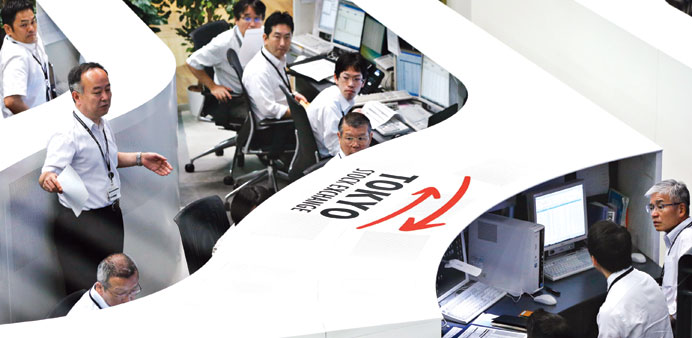Employees work at the Tokyo Stock Exchange. Tokyo Electric Power Co will be added to the JPX-Nikkei Index 400 when the gauge changes its constituents next month.
Bloomberg/Tokyo
A stock index showcasing Japan’s best companies is about to include one of its most controversial: the utility behind the worst nuclear disaster since Chernobyl.
The JPX-Nikkei Index 400 picks firms with the best operating income, return on equity and market value to shame executives of those it excludes into boosting profit and shareholder returns. Tokyo Electric Power Co, or Tepco, will be added when the gauge changes its constituents next month, according to Nomura Holdings, Daiwa Securities Group and Mizuho Financial Group. Surges in earnings and share price sent the operator of the crippled Fukushima Dai-Ichi power plant into contention for a place.
Inclusion in the government-inspired index means the world’s largest pension fund, which is estimated to own more than half the assets tracking the measure, would buy more of a company’s shares. Adding Tepco raises questions about the quality of a gauge devised as a badge of honour for the 400 stocks chosen each year.
“There’s much debate on whether Tepco is suitable for an index of good companies, but if you abide by the rules, you can’t exclude it,” said Keiichi Ito, chief quants analyst at SMBC Nikko Securities in Tokyo. “Many investors don’t own the stock, so the effect on the share price could be big.”
JPX-Nikkei 400 constituents are picked based on three-year average return on equity, which measures how efficiently capital is used, and cumulative operating profit, each accounting for 40% of the selection criteria. Market value makes up the remaining 20%. About 10 firms can also be replaced based on corporate-governance standards, such as providing English- language results and appointing at least two independent outside directors.
The JPX-Nikkei 400 climbed 0.7% at the close of trading on Friday in Tokyo, while the broader Topix index gained 0.8%. Tepco jumped 6.2%.
Tepco jumped from 973rd last year to 280th under the selection criteria, according to analysis by Mizuho.
The utility’s market value rose to ¥1.1tn ($8.62bn) as of the June 30 calculation date, about 60% higher than a year before, as shares jumped on optimism Japan will restart its nuclear plants.
Three-year average ROE is about 12%, compared with minus 29% a year earlier. Cumulative operating income over the three years also turned positive, buoyed by two years of profit.
Core meltdowns at three reactors in Tepco’s Fukushima Dai- Ichi station in March 2011 forced the evacuation of about 160,000 people and rendered some areas uninhabitable for decades. The company has faced radiation leaks at the Fukushima site, questions over the hiring and treatment of workers there, and has been accused of having a lax safety culture that allowed “man-made” failures to occur before and after the 2011 earthquake and tsunami.
Former chairman Tsunehisa Katsumata and two other executives will be indicted for professional negligence that resulted in death, public broadcaster NHK reported on Friday in Tokyo.
“People wouldn’t expect a company like Tepco to be in an index that’s supposed to represent dynamic Japan,” said Jonathan Allum, a strategist at SMBC Nikko Capital Markets in London. “The index isn’t quite what it’s cracked up to be.”
This is the second reassessment of the shame gauge’s constituents since the index started last year. In the first, Panasonic Corp was among 31 companies added, while fellow consumer-electronics manufacturer Sony Corp was dumped. This year, Toshiba Corp may be removed after its $1.2bn accounting scandal. The company must correct earnings stretching back six years after an internal probe revealed managers overstated profits under pressure from executives.
“Toshiba’s financial data are wrong, so they’re not even at the starting line” for selection, Japan Exchange Group Chief Executive Officer Akira Kiyota told reporters on July 28 in Tokyo, suggesting the bourse won’t be lenient on the 140- year-old manufacturer.
Lixil Group Corp may meet the same fate, according to Hayato Nagayoshi, chief quantitative analyst at Mizuho Securities Co. The housing-materials maker’s position is in doubt after it reported accounting irregularities at its German unit. McDonald’s Holdings Co (Japan) will probably also be dumped, say brokerages including Bank of America Corp’s Merrill Lynch unit and Daiwa Securities Group, after food scandals prompted restaurant closures and led to losses.
Toshiba must go, and Tepco shouldn’t even be considered given its troubles, according to Ayako Sera, a Tokyo-based strategist at Sumitomo Mitsui Trust Holdings.
“Investors will lose faith in the JPX-Nikkei 400” if Tepco gets in, Sera said. “They need to exercise discretion beyond quantitative criteria if they want to protect the integrity of the index.”

